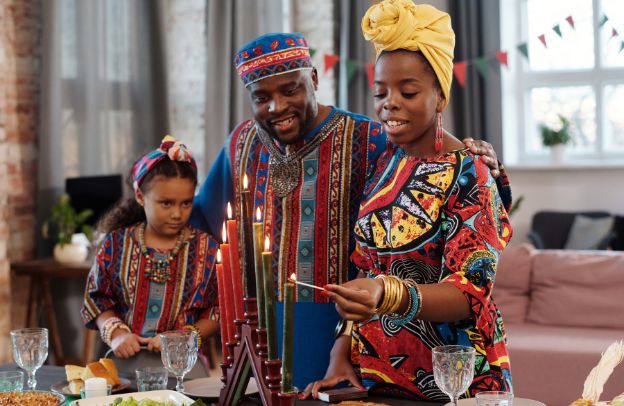How To Strengthen African Diaspora Bonds Through Storytelling – The Diaspora Storytelling Series

Storytelling has long been a powerful tool for connecting communities, preserving cultural heritage, and fostering a sense of belonging. Within the African diaspora, storytelling holds particular significance as a means of bridging geographical distances and transcending generational gaps. This article will delve into the profound impact that storytelling can have in building and strengthening connections among individuals of African descent spread across the globe.
Want to learn more about storytelling? Start by downloading the first chapter of The Storytelling Series for Small Businesses.
One way storytelling facilitates connection within the African diaspora is by preserving and passing down cultural traditions. Through the retelling of ancestral stories, myths, and legends, individuals can reconnect with their roots, gain a deeper understanding of their cultural heritage, and develop a sense of pride in their shared history.
This shared narrative not only helps to unite members of the diaspora but also allows for the transmission of values, beliefs, and wisdom across generations.
The benefits of storytelling African Diaspora
Storytelling serves also as a platform for raising awareness about the diverse experiences and struggles faced by individuals within the African diaspora. By sharing personal narratives, testimonies, and oral histories, storytellers can shed light on the unique challenges, triumphs, and contributions of their respective communities.
This process fosters empathy, understanding, and solidarity among individuals who may have different backgrounds but share a common thread of African heritage. Furthermore, storytelling provides a space for collective healing and empowerment. Through the sharing of personal stories, trauma, resilience, and triumphs can be acknowledged and validated.
By amplifying the voices of individuals within the diaspora, storytelling can offer a platform for marginalized perspectives, challenge stereotypes, and promote social justice. In this way, it becomes a powerful tool for self-expression, agency, and social change.
How technology can contribute to effective Storytelling in African Diaspora
In today’s interconnected world, technology plays a crucial role in facilitating storytelling and connecting members of the African diaspora. Digital platforms, social media, podcasts, and online communities provide accessible and inclusive spaces for sharing narratives, exchanging ideas, and cultivating dialogue across geographical boundaries.
These platforms enable individuals to find common ground, forge new connections, and strengthen existing networks within the diaspora. Here are three key ways:
Digital Media and Online Platforms:
Social Media: Platforms like Instagram, Twitter, and TikTok allow creators to share short, impactful stories, visuals, and insights related to the African Diaspora. The use of hashtags and trends can help stories gain widespread attention.
Blogs and Websites: Content creators can use blogs and websites like Aclasses.org to share in-depth narratives, historical information, personal experiences, and cultural insights, relating to the African Diaspora. These platforms are accessible to a global audience.
Podcasts and Webinars: Digital audio and video content can be used to host discussions, interviews, and storytelling sessions that explore the African Diaspora. Podcasts and webinars enable a more intimate and engaging way to share stories.
Virtual Reality (VR) and Augmented Reality (AR):
VR Experiences: Virtual reality can immerse audiences in the stories of the African Diaspora by creating interactive, 3D environments that provide a deep sense of presence. Users can explore historical events, cultural traditions, and personal stories as if they were there.
AR Apps: Augmented reality applications can enhance the storytelling experience by overlaying digital information in the real world. For example, users could use AR apps to learn about the history of specific locations with ties to the African Diaspora as they explore them in person.
Data Visualization and Infographics:
Data-Driven Storytelling: Modern technology enables storytellers to use data visualization tools to illustrate historical and contemporary data related to the African Diaspora. Infographics, interactive charts, and maps can make complex information more accessible and engaging.
Interactive Websites and Apps: Storytellers can develop interactive websites and apps that allow users to explore historical timelines, demographic information, and cultural influences within the African Diaspora. These tools can be valuable for educational purposes.
Incorporating modern technology into storytelling for the African Diaspora not only expands the reach and accessibility of these stories but also offers new and engaging ways for audiences to connect with the narratives, promoting cultural awareness, education, and empathy.
5 types of Storytelling to Strengthen African Diaspora Bonds
Storytelling is a powerful tool for strengthening bonds within the African Diaspora. It can help preserve culture, share experiences, and foster a sense of community. Here are five types of storytelling that can be used to strengthen African Diaspora bonds:
- Oral Tradition: Many African cultures have a rich tradition of oral storytelling, where stories, myths, and history are passed down through generations by word of mouth. Encouraging the sharing of oral stories can help connect individuals within the African Diaspora to their roots and heritage.
- Personal Narratives: Sharing personal stories and experiences can be a powerful way to connect with others who have had similar experiences. These narratives can cover a wide range of topics, from migration and identity to family histories and cultural traditions.
- Folklore and Myths: African folklore is rich with tales of heroes, tricksters, and mythical creatures. Sharing and celebrating these stories can provide a sense of cultural continuity and connect people from different parts of the African Diaspora through shared myths and legends.
- Historical Storytelling: Sharing stories of African and African Diaspora history, including struggles for liberation and civil rights movements, can create a sense of unity and resilience. These stories remind individuals of the strength and determination of their ancestors.
- Artistic Expression: Art forms like music, dance, literature, and visual arts are powerful vehicles for storytelling. Artists within the African Diaspora can use their work to communicate their experiences, struggles, and triumphs, creating a sense of shared cultural identity and solidarity.
Through these various forms of storytelling, individuals within the African Diaspora can come together, build a sense of community, and strengthen their bonds by celebrating their shared history, culture, and experiences.
Conclusion
By embracing storytelling as a means of building connections, the African diaspora can nurture a collective sense of identity, foster cultural exchange, and empower individuals to actively engage with their heritage. Through the power of stories, the bonds among African diasporas can be revitalized, celebrated, and strengthened for generations to come.
Want to learn more about storytelling? Start by DOWNLOADING a free chapter of The Storytelling Series at https://aclasses.org/freechapter/





